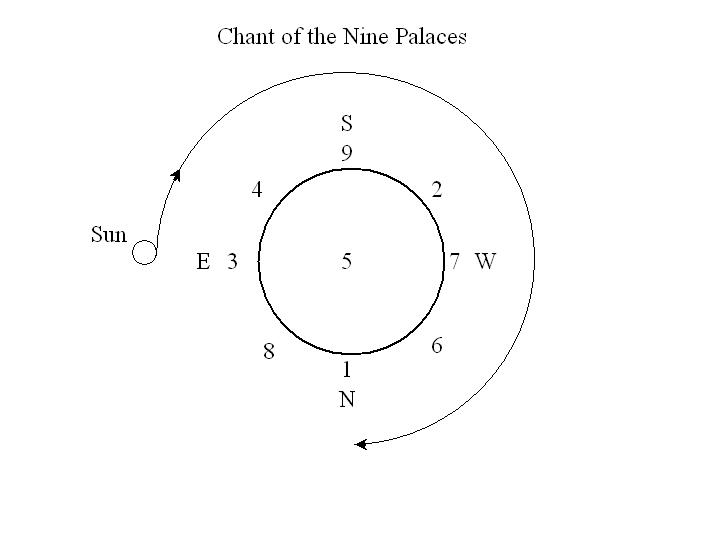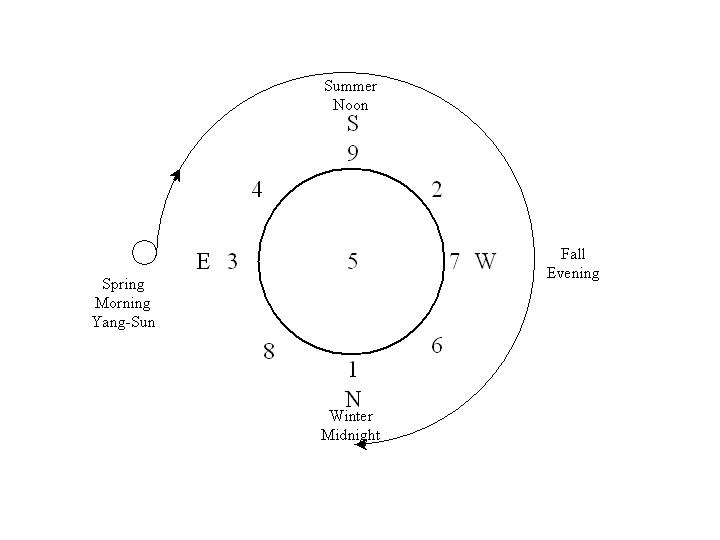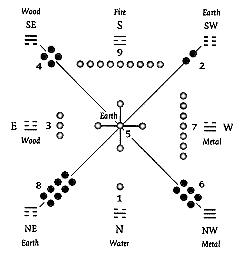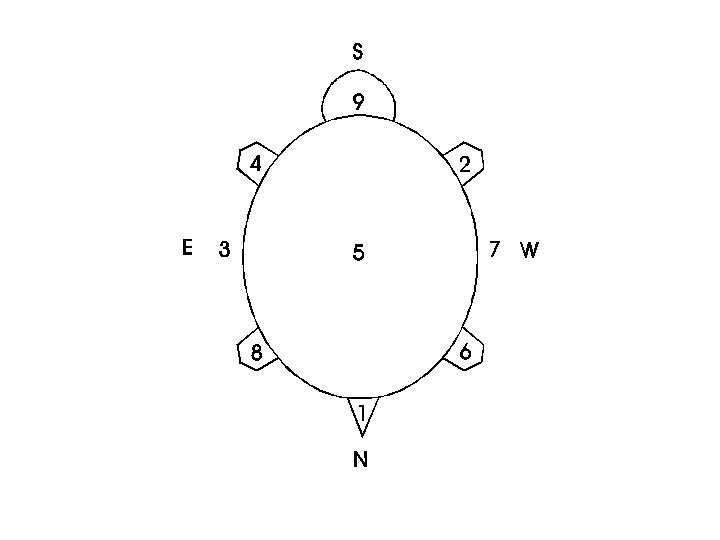|
|
||||||||||||
Sacred Turtle and the Chant of the Nine Palaces
A work in progress...


The King Chu Arrangement
King Chu (1231 - 1131 B.C.), is credited with constructing the hexagrams of the I-Ching through contemplation of the trigrams while he was in jail (around 1143 B.C.). Additionally, Chu is credited with devising the "Later Heaven" arrangement of the eight trigrams. Some say that this trigram arrangement was probably devised from the Lo Shu (Lo Writings or Lo Scroll), which is said to have been derived from the markings on the shell of a "mystical turtle" that crawled out of the Lo river when the Emperor Yu was draining off the floods. From this scroll the Chiu Kung (Nine Halls or Nine Palaces), which have an important place in Chinese numerology, were also derived.
It is possible that the Late Heaven arrangement of the trigrams was derived from either the Lo Scroll or the the Nine Palaces since the numerological arrangements of the three diagrams coincide. When looking at the Later Heaven (King Chu) arrangement, we read the progressive pattern along the periphery in a clockwise rotation. Reading the trigrams in a circular arrangement symbolizes the elements of infinity and continuity. The movement in this arrangement flows from the superficial qualities to deep qualities, from new life to maturation of life, and from the physical existence to the spiritual existence. Whereas the Early Heaven (Fu Hsi) arrangement is based on a balance of opposing forces representing a primordial order based in stillness and beyond space and time parameters, the Later Heaven arrangement depicts the development of life in the time-spaced conditioned world. We see the Later Heaven arrangement as representing cyclical recurrent change, but there is also an element of non-recurrent change in the form of progress. As we finish one cycle, the evolutionary nature of man and the universal process would lead to the next cycle being traveled at a higher level of consciousness, knowledge, or growth.
If we step back and take a look from a three dimensional perspective, we see
that an upward spiraling pattern of change is created. We read the Later Heaven
sequence starting with Chen trigram (Thunder--the arousing).  The Chen trigram is
representative of Spring, the 6th hour, and the East, and thus expresses the
dynamic appearance of life force. It is all that stirs up latent energies and
stimulates them into movement and growth. It is the beginning, the seed, the
inspiration that leads to development. The Chen trigram stimulates a firm base
for all growing things, it is the striving of new growth towards the light. The
arousing movement is carried in the direction of growth, development and
maturation by the energy of the Sun trigram (Wind--the gentle). It is in the Sun
trigram that the latent energies stimulated by the arousing Chen are shaped. The
gentle wind nurtures and guides. The new consciousness that received the spark
of Thunder and is directed by the Wind reaches maturation in the Li trigram
(Fire--the clinging). The Li trigram is representative of Summer, the 12th hour,
and the South and thus expresses the attainment of full maturity. The clinging
nature of this trigram is representative of attachment to the new energy that
took form under the Sun trigram. You are exploring the possibilities of the new
creation and thus have an intense inquisitive kind of interest. You are, in a
sense, like a child clinging to a new toy. The seed that was planted in the
Spring reaches maturity under the Summer sun. Once the consciousness has been
nourished in the creative faculties of light and heat under the Li trigram, it
moves into the receptive and productive K'un trigram (Earth--the receptive). In
the K'un trigram the consciousness, which matured in an outward sense under the
trigram Li, is assimilated, digested, and integrated. The K'un trigram
represents openness to new knowledge and the ever changing condition of the
world. It is the extreme yin and thus totally receptive. That which is explored
under the Li is absorbed into the being under the K'un trigram. This is the
beginning of the transition from superficial to deep; from a physical
consciousness to a spiritual consciousness; from a mental idea to intuitive
knowledge. The knowledge assimilated under the K'un trigram moves inward under
the Tui trigram (Lake--the joyous). The Lake trigram is representative of
Autumn, the 18th hour, and the West. It is a time of harvest and celebration and
moves towards quiet and contemplation. That which is received under the K'un
trigram is accepted internally under the energy of Tui. It is an internal
harvesting of new knowledge. Once movement turns inward under the Tui trigram,
it is touched by the spirit under the Ch'ien trigram (Heaven--the creative).
This trigram represents the yang aspects of heaven, health, and strength. Deep
contemplation and movement towards a greater connection manifests under this
trigram. Creative inner forces begin to stir. The seed that sprouted in the
Spring, was nourished and reached maturation in the Summer, and harvested in the
fall has been consumed and is digesting under the Ch'ien trigram. The creative
nature of this trigram comes forth when the outer idea moves inward and inner
growth begins. The creative inner forces dive deep into the essence of the being
under the K'an trigram (Water--the abysmal). The K'an trigram is representative
of Winter, the midnight hour, and the North. There is deep contemplation,
meditation, and inward movement. The abysmal represents spiritual depth and
inner stillness. From the depths of the water arises the steadfastness of
inwardness represented under the Ken trigram (Mountain--the resting). In the
mountain there is completeness in the sign of keeping still. The Shuo Kua
(Discussion of Signs) says "He exerts himself in the sign of K'an, the
abysmal. He completes himself in the sign of Ken."5 Development has come
full circle. The stillness and meditative poise of the mountain is a preparation
for new life. For as the mountain sits in stillness, clouds begin to form above
and stimulating energies are released once again under the Thunder (the
arousing) trigram. Just as there are daily cycles, yearly cycles, and even 60
year cycles in nature, you can become aware of a number of simultaneous cycles
occurring in the context of your own life and inner development. Analogies
relating cycles of nature to human development are not unique to the Chinese or
the I-Ching. These correspondences can be found in the writings of many
traditions and cultures from the beginning of history. Study of the trigrams of
the I-Ching will provide a symbology that can help trigger intuitive
understanding of life events. As you work with the trigrams and experience the
movement and symbology associated with each, you will notice that the trigrams
will have different meaning according to the place, time, situation, or context
which the symbol is experienced. Thus the trigrams are not fixed concepts. They
will appear differently at different levels of thought, on different levels of
awareness, and at different times of the day, week, month, and year.
The Chen trigram is
representative of Spring, the 6th hour, and the East, and thus expresses the
dynamic appearance of life force. It is all that stirs up latent energies and
stimulates them into movement and growth. It is the beginning, the seed, the
inspiration that leads to development. The Chen trigram stimulates a firm base
for all growing things, it is the striving of new growth towards the light. The
arousing movement is carried in the direction of growth, development and
maturation by the energy of the Sun trigram (Wind--the gentle). It is in the Sun
trigram that the latent energies stimulated by the arousing Chen are shaped. The
gentle wind nurtures and guides. The new consciousness that received the spark
of Thunder and is directed by the Wind reaches maturation in the Li trigram
(Fire--the clinging). The Li trigram is representative of Summer, the 12th hour,
and the South and thus expresses the attainment of full maturity. The clinging
nature of this trigram is representative of attachment to the new energy that
took form under the Sun trigram. You are exploring the possibilities of the new
creation and thus have an intense inquisitive kind of interest. You are, in a
sense, like a child clinging to a new toy. The seed that was planted in the
Spring reaches maturity under the Summer sun. Once the consciousness has been
nourished in the creative faculties of light and heat under the Li trigram, it
moves into the receptive and productive K'un trigram (Earth--the receptive). In
the K'un trigram the consciousness, which matured in an outward sense under the
trigram Li, is assimilated, digested, and integrated. The K'un trigram
represents openness to new knowledge and the ever changing condition of the
world. It is the extreme yin and thus totally receptive. That which is explored
under the Li is absorbed into the being under the K'un trigram. This is the
beginning of the transition from superficial to deep; from a physical
consciousness to a spiritual consciousness; from a mental idea to intuitive
knowledge. The knowledge assimilated under the K'un trigram moves inward under
the Tui trigram (Lake--the joyous). The Lake trigram is representative of
Autumn, the 18th hour, and the West. It is a time of harvest and celebration and
moves towards quiet and contemplation. That which is received under the K'un
trigram is accepted internally under the energy of Tui. It is an internal
harvesting of new knowledge. Once movement turns inward under the Tui trigram,
it is touched by the spirit under the Ch'ien trigram (Heaven--the creative).
This trigram represents the yang aspects of heaven, health, and strength. Deep
contemplation and movement towards a greater connection manifests under this
trigram. Creative inner forces begin to stir. The seed that sprouted in the
Spring, was nourished and reached maturation in the Summer, and harvested in the
fall has been consumed and is digesting under the Ch'ien trigram. The creative
nature of this trigram comes forth when the outer idea moves inward and inner
growth begins. The creative inner forces dive deep into the essence of the being
under the K'an trigram (Water--the abysmal). The K'an trigram is representative
of Winter, the midnight hour, and the North. There is deep contemplation,
meditation, and inward movement. The abysmal represents spiritual depth and
inner stillness. From the depths of the water arises the steadfastness of
inwardness represented under the Ken trigram (Mountain--the resting). In the
mountain there is completeness in the sign of keeping still. The Shuo Kua
(Discussion of Signs) says "He exerts himself in the sign of K'an, the
abysmal. He completes himself in the sign of Ken."5 Development has come
full circle. The stillness and meditative poise of the mountain is a preparation
for new life. For as the mountain sits in stillness, clouds begin to form above
and stimulating energies are released once again under the Thunder (the
arousing) trigram. Just as there are daily cycles, yearly cycles, and even 60
year cycles in nature, you can become aware of a number of simultaneous cycles
occurring in the context of your own life and inner development. Analogies
relating cycles of nature to human development are not unique to the Chinese or
the I-Ching. These correspondences can be found in the writings of many
traditions and cultures from the beginning of history. Study of the trigrams of
the I-Ching will provide a symbology that can help trigger intuitive
understanding of life events. As you work with the trigrams and experience the
movement and symbology associated with each, you will notice that the trigrams
will have different meaning according to the place, time, situation, or context
which the symbol is experienced. Thus the trigrams are not fixed concepts. They
will appear differently at different levels of thought, on different levels of
awareness, and at different times of the day, week, month, and year.

